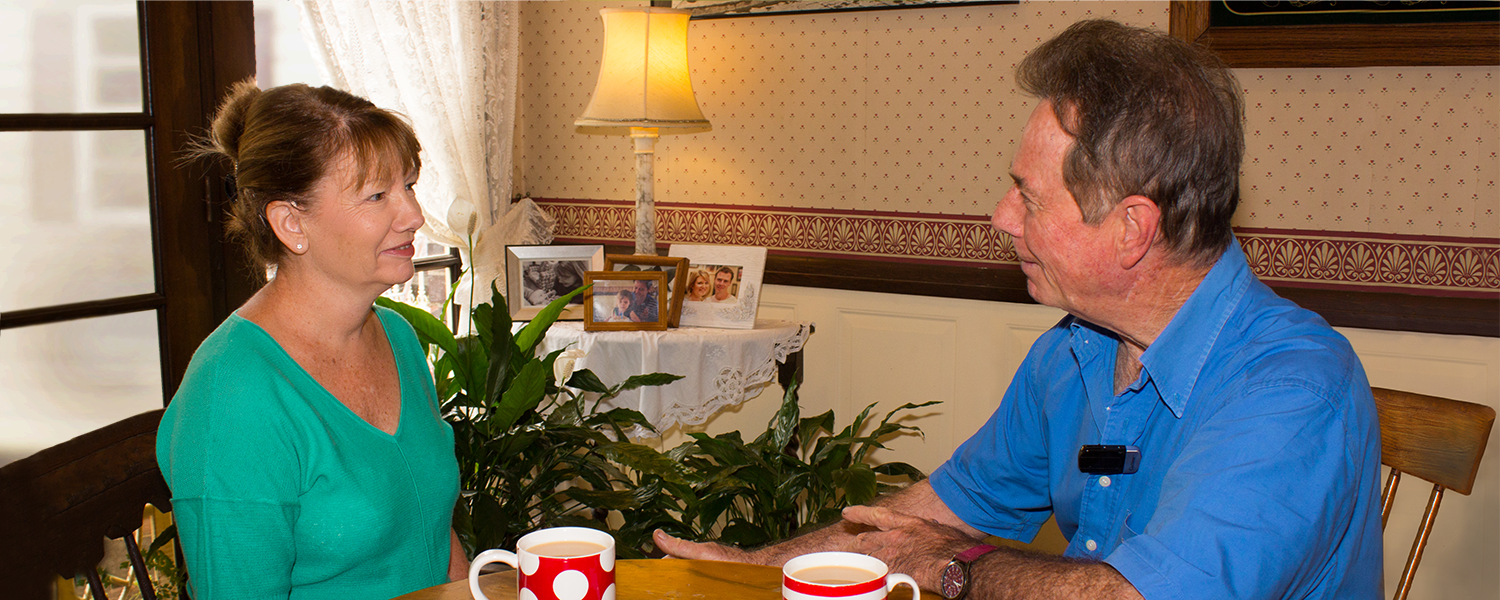Karen Cooper is enjoying retirement. As her hearing deteriorated, Karen’s job in financial planning at a major bank became too stressful and even with hearing aids, her confidence took a hit.
Karen says she used to think ‘When you’re with clients, you can’t say “I’m deaf”. I would try to lip read and just do my best to understand, read the notes and get around it in other ways. But it was exhausting.’
Now a cochlear implant recipient for more than eight years, Karen no longer hides her hearing loss with the people she meets day to day and confidently uses her CochlearTM devices and accessories to make her retirement activities more enjoyable.
Active in her local church, Karen uses a Cochlear Wireless Mini Microphone 2+ to help her with social situations where there is a lot of background noise.
She pins the microphone on herself when serving morning tea so that she can hear the people in front of her as they chat and move along the line. Karen also uses her Mini Microphone at doctors’ appointments and during her craft group meetings to be able to hear everything being said.
‘I used to protect myself by not saying anything; I was worried about giving the wrong answers and that people thought I was stupid,’ she explains.
‘Now that I have a cochlear implant, I’m not embarrassed. I bring my Mini Microphone out and put it on the table, explain to people that I’m deaf and [the microphone] helps me to hear them.’
Karen does remember the early days after switch-on and the importance of persevering and asking others to help with your rehabilitation.
‘I could hear straight away – I could hear voices. But it took a while to recognise many sounds,’ says Karen, who would often ask her husband Kevin to help her identify sounds around the house.
‘At the beginning and for quite a while after [I got my implant], I would hear sounds that I just didn’t recognise because I hadn’t heard them for such a long time – like the beeping sounds the fridge makes when it’s left open too long or the microwave when a dish is done.’
Karen’s friend, Helen, naturally spoke slowly and clearly with pauses and breaks, and Karen would often call her to practise talking on the phone. She would close her eyes to shut out distractions and help her to concentrate on what was being said.
Another strategy Karen employed was calling insurance companies and banks ‘just to listen to the automated voice, and practise listening and understanding well enough to choose the correct options’.
She found understanding the voice on her GPS system difficult at first; she would have to look at the map on her dashboard screen to follow the directions. But by continuing to set the GPS with the sound turned on, Karen’s ‘brain caught up’ and suddenly, one day as she pulled into the curb she heard the automated voice say, ‘You’re at your destination’.
Here are Karen’s tips for learning to identify sounds and speech with your cochlear implant:
- Ask others to help you identify sounds that are new or forgotten, even if it turns out to be as simple as a bird call or the oven timer beeping.
- If you’re learning to use the phone again, organise a daily call with a patient friend or family member who has a slow, clear speaking voice.
- Listen to podcasts or talkback radio. You’ll not only learn to hear different kinds of voices, you’ll gain the confidence to talk to others about current affairs.
- Ask your audiologist about devices like the Mini Microphone 2+ that will help you hear better in noisy social settings. Don’t be afraid to pull it out and use it with your doctor or at social gatherings, or to ask a speaker at functions to put it on their lectern or wear it on their lapel.
- Persevere! Find what exercises work for you and keep practising, but also get advice from others in your hearing support group.




